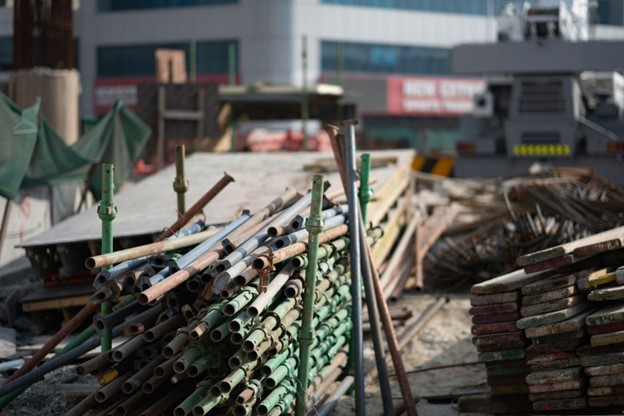Did you know that the construction industry in the UK produces over 120 million tonnes of waste each year? That’s a staggering amount of material, much of which ends up in landfills. Sustainable construction practices are becoming increasingly important, and professional waste removal services play a crucial role in this effort.
Sustainable construction involves environmentally friendly practices throughout a building’s lifecycle. It’s not just about using green materials but also about managing discarded materials effectively. One of the biggest challenges is handling builders’ waste, which includes materials like concrete, wood, metals, and plastics. Effective builders waste removal is key to achieving sustainability goals.
Sustainability Benefits of Professional Waste Removal Services
When it comes to sustainability, using professional waste removal services offers significant advantages over DIY removal. Professional services have the expertise and resources to ensure that a high percentage of rubbish is recycled and repurposed, significantly reducing the amount sent to landfills.
They utilize specialized equipment for efficient builders’ waste collection and handling of materials, ensuring that hazardous materials are managed safely and in compliance with environmental regulations. Moreover, professional services often collaborate with recycling centers and waste processing facilities to maximize the reuse of materials, thereby conserving natural resources and minimizing the environmental footprint of construction projects.
Professional waste removal services are vital for managing discarded construction materials efficiently. Here are some key reasons why:
- Lower carbon footprint: Efficient construction material management practices help lower the overall carbon footprint of construction projects.
- Safer sites: Regular removal of discarded materials keeps construction sites safer and more organized.
- Proper handling of hazardous materials: Professional services handle hazardous materials safely, protecting workers from potential health risks.
- Streamlined process: These services handle the entire process of rubbish collection, sorting, and disposal, making it hassle-free for construction companies.
- Specialized equipment: They use specialized equipment to manage large volumes of waste quickly and efficiently.
- Conserving resources: By recycling metals, wood, and concrete, they help conserve natural resources and reduce the need for new materials.
- Understanding local laws: Professional services are well-versed in local regulations, ensuring that all waste is disposed of legally and responsibly.
- Avoiding fines: Compliance with these regulations helps construction companies avoid fines and legal issues.
While DIY waste removal might seem like a cost-effective option, it often lacks the efficiency, safety, and sustainability that professional services provide. For construction sites, opting for professional assistance is not just a matter of convenience; it’s a commitment to safety, sustainability, and legal compliance.
Future Trends in Sustainable Construction Waste Management
Current trends reflect the global inclination towards sustainability. In the UK, construction, demolition, and excavation industries generate about 61% of all waste, with an impressive recovery rate of 91% (Biffa). This high recovery rate is due to the recycling of materials like metals, concrete, and wood, which are in high demand and retain their quality after reuse.
The practice of deconstruction, which involves carefully dismantling buildings to salvage materials, is gaining momentum. This method contrasts with traditional demolition by maximizing the reuse of materials, thus supporting the circular economy. The UK government’s Construction 2025 Strategy emphasizes minimizing waste and promoting the reuse of construction materials, which aligns with broader sustainability goals.
But what does the future hold for the industry? The implementation of even more advanced technology seems to be just a matter of time, while regulations are expected to become more stringent. Let’s take a closer look.
Future Projections
The adoption of AI and robotics in waste management is anticipated to transform the industry. AI can enhance refuse sorting processes, while robotics can handle hazardous materials safely. The integration of these technologies is projected to grow significantly, driving efficiency and safety in waste management practices.
The construction industry is moving towards circular economy principles, where materials are continuously recycled and reused. This approach not only reduces the demand for new resources but also significantly cuts down on CO2 emissions.
Government regulations are becoming increasingly stringent. The European Union countries will be required to recycle at least 55% of municipal waste by 2025 and gradually raise that goal. In the UK, the government’s support for a circular economy is evident in policies like the Construction 2025 Strategy, which sets ambitious targets for waste reduction and energy efficiency.
The Final Insight
In big cities like London, where constructions are incessant and space is at a premium, the role of professional waste removal services cannot be overstated. These services not only streamline waste management processes but also ensure that sustainability goals are met. With professional waste management, cities can achieve significant environmental benefits, foster healthier communities, and pave the way for a greener future.

